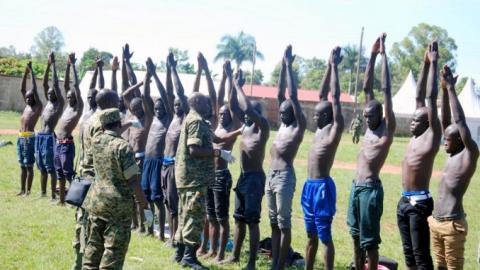LDU Recruitment: What Locals Say
 Submitted by jbimokola on
Submitted by jbimokola on

The recruitment of Local Defence Unit Personnel (LDU) for deployment in Kampala, Mukono and Wakiso districts starts today.
The Uganda People’s Defence Forces (UPDF) officers will be recruiting men and women between 18 and 35 years to work as reserve forces and help beef up security in Kampala and its environs. This is one of the measures announced by President Yoweri Museveni early this month in the wake of targeted shootings around Kampala that have claimed several prominent people
"H.E the President and Commander- in- chief of the Armed forces directed a call up of reserves to support enforcement of law and order in Kampala Metropolitan area. In fulfillment of this directive, the Ugandan Peoples' Defence Force (UPDF) announces that the recruitment of the Local Defence Units ( LDUs) personnel from the districts of Kampala, Mukono and Wakiso will take place starting on 25th September and end on October 2018," Ministry of Defence and army spokesman, Brig Richard Karemire, said in a statement.
President Museveni announced the measures shortly after the shooting of former Buyende district police commander, ASP Muhammad Kirumira, on the evening of Saturday, September 8. Kirumira together with a female friend, Resty Mbabazi, were gunned down at Bulenga near the flamboyant police officer’s home in Wakiso district, by two assassins who were riding on a motorcycle.
This was the second high profile shooting this year, after that of Col Ibrahim Abiriga, the Arua Municipality MP who was shot dead in a similar style together with his young brother, Said Butele Kongo, on the evening of June 8. The two were traveling to Abiriga’s home in Kawanda, Wakiso district.
According to the UPDF, those interested to join the LDU force must be citizens of Uganda, be aged between 18 and 35 years old, holders of original national identity cards, healthy and mentally fit. The candidates should also be ready to undergo medical and physical body checkup and a road run to test endurance and body fitness.
Other requirements include minimum formal education of primary seven to senior four, should not be engaged in any employment, have no criminal record. To confirm the above conditions, they are expected to travel with recommendation letters from LC1 chairperson, LC1 Secretary for Defence and from internal security officers at the parish and district levels.
Citizens react
Ssebagala Shafick, a resident of Nakulabye welcomes the plan as good. “I credit the government for making such a move towards promoting security in the country, never know the killers will be caught in the process," he says.
Justine Najjuuko of Mbuya, a suburb of Kampala, says should be trained to handle civilians in their line of duty. "It's good but the recruits should be trained effectively on how to handle civilians to do away with violence and torture like it has been of late," she noted.
For Hamidu Kawalya, the recruitment will create job opportunities. "It will create jobs for young people instead of engaging in theft, murder and abuse of drugs," she asserts.
Godfrey Ayiko, a senior four drop-out now living in Mukono district, has picked interest to join the recruitment exercise. "I dropped out of school because there was no money so I have to use this chance. I am still young and energetic yet jobless. I am confident that I will be considered," Ayiko said.
Shiphrah Kwagala, a student at Makerere University says that while the move is welcome, she’s uncomfortable with what she calls tension that comes with deployment of security personnel. "For me security just creates more tension than feeling secure. Yes it will improve security in one way or another but the tension might outweigh the security purpose. She says ordinary people fear being near the police or other security agencies because of the way they are handled. “Some people might fail to concentrate on their businesses for fear that they will be arrested or probably a riot is about to happen," she added.
Richard Jumba, a resident and businessman of Makerere Kavule, a suburb near Makerere University commonly known as Kikumi Kikumi, says the recruitment will reduce kidnaps, protests and several other cases of crime in Kampala. “It will also be an assurance of security for the people who work up to late," he noted.
A police officer who declined to reveal his identity said the recruitment will be good for the residents of those areas because security will be in their reach any time other than waiting to go to police which may be far.
- 1487 reads
